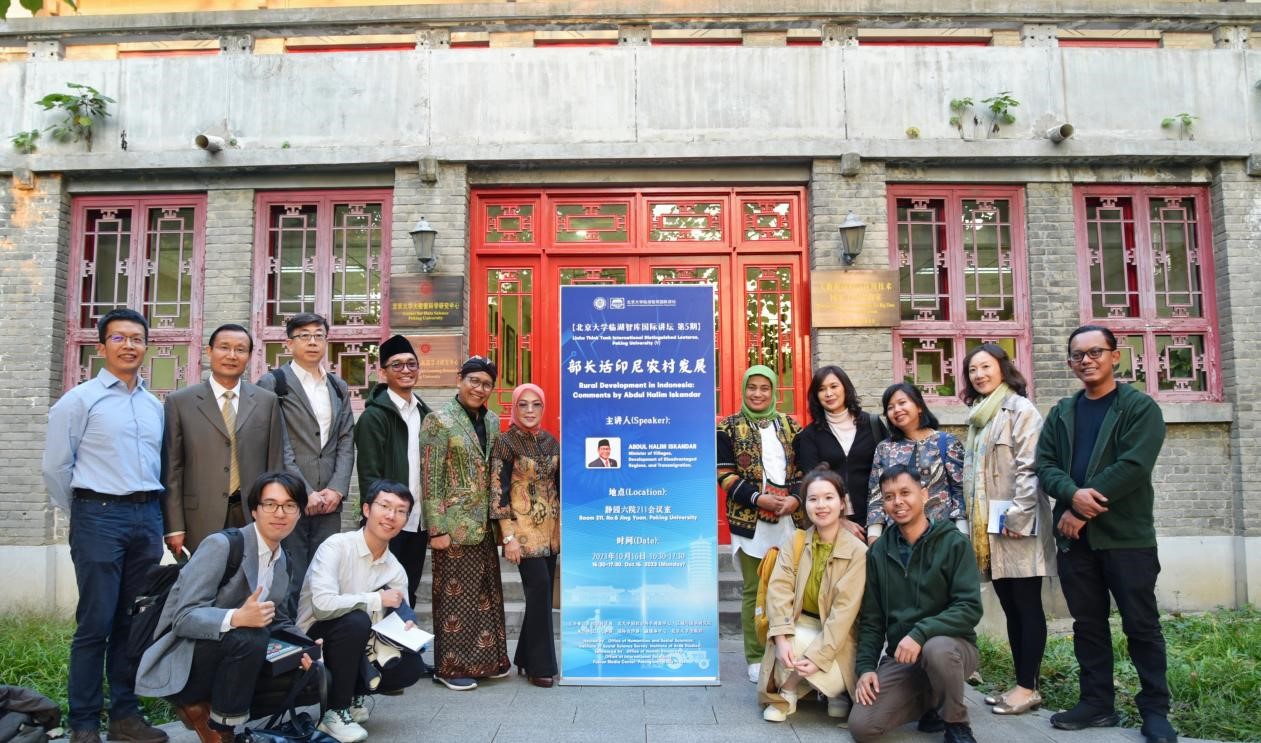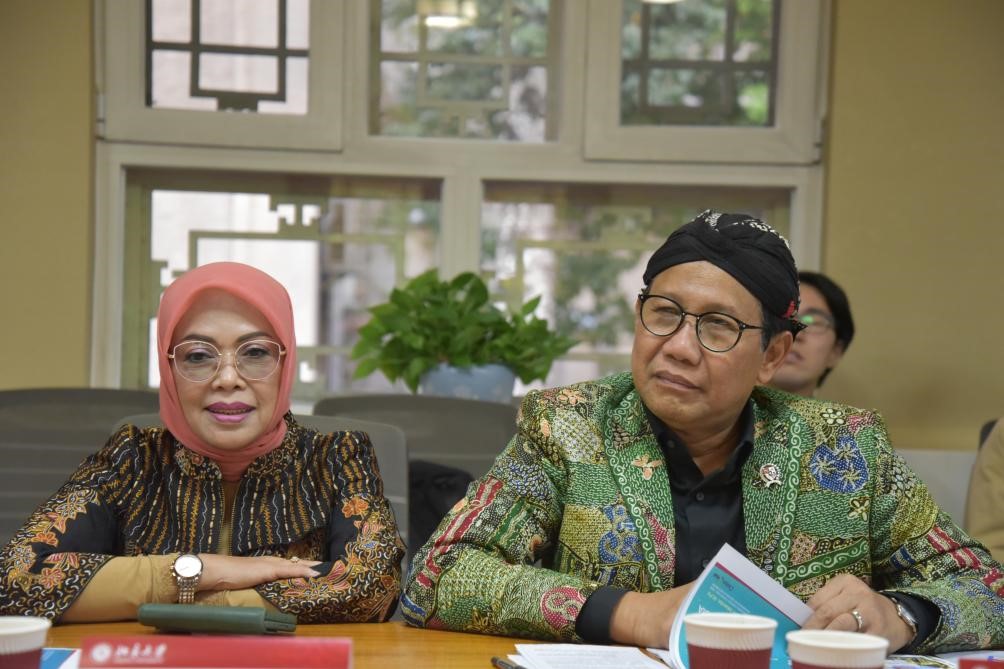On the afternoon of October 16, 2023, Abdul Halim Iskandar, minister of Indonesia's Ministry of Villages, Development of Disadvantaged Regions and Transmigration, led a delegation to visit Peking University (PKU). PKU Vice President Wang Bo met with the guests at Linhuxuan. Zhai Kun, deputy director of the Institute of Area Studies (IAS); Liu Chengfang, deputy director of the School of Modern Agriculture; Li Yun, director of the Office of International Relations; Kong Tao, senior research fellow of the Institute of Social Science Surveys; Qie Lisa, director of the Indonesian Teaching Office of the School of Foreign Languages; and assistant professor Xie Kankan of the School of Foreign Languages, also attended the meeting. Wang Bo warmly welcomed the guests, introduced PKU’s history and current situation, and specifically mentioned the international exchanges of Indonesian students at PKU. Minister Iskandar thanked PKU for the warm reception. He said that he loved Chinese culture and looked forward to further cooperation with PKU and other Chinese universities.

After the meeting, Minister Iskandar gave a presentation titled “Indonesia’s Rural Development Policy”—the sixth in the Adventus Amicorum lecture series—in Conference Room 211 of No. 6 Jingyuan. In the lecture, the minister introduced various measures of the Indonesian government to build rural areas. The lecture was moderated by Kong Tao. Other participants included Liu Jinping, director of the Cadre Management School of the Ministry of Agriculture and Rural Affairs; Zhai Kun; and Xie Kankan as well as students from multiple departments.
Minister Iskandar first introduced the overall situation of rural Indonesia. Indonesia has many villages, with a total of 75,265 village-level units in the country, all of which are under the overall management of the Ministry of Villages, Development of Disadvantaged Regions, and Transmigration. The Indonesian national political system consists of a three-tier administrative structure: the central government, provincial governments (provinsi), and municipal governments (kabupaten). In addition to this, there are many village- and town-level (desa) political units under the county-level government. Village chiefs are elected at the grassroots level and are responsible to their voters. They are not affiliated with the government administrative system but still play a very important role in administrative operations. Village units maintain their own independent budgets and use them independently under the supervision of voters. Among all government financial operations in Indonesia, rural budget allocation has the highest transparency and is formulated with the participation of different representatives, including female representatives, community leaders and cultural elites.
Under President Jokowi’s administration, Indonesia’s rural budget has grown from 24 trillion rupiah in 2014 to 124 trillion rupiah in 2023. The minister pointed out that Indonesia’s rural income mainly consisted of three parts, namely rural agricultural tax, rural fund (dana desa), and rural allocable funds (alokasi dana desa). In the process of gradual reform, rural funds and rural allocable funds have increased significantly. Rural areas can realize self-management of funds, which is more conducive to independent economic development. With the help of the Rural Fund, Indonesia’s rural development has made great progress in both living standards improvement and economic growth. From 2015 to 2023, Indonesia paved 320,000 kilometers of roads in rural areas, established more than 14,000 rural markets, and added nearly 600,000 additional irrigation facilities. The government also promoted the construction of 6,432 water storage facilities in rural areas to adjust the seasonal water balance, and the results have been remarkable.
Minister Iskandar noted the new achievements in Indonesia’s rural economic development from 2015 to 2023. In the past eight years, the number of villages identified as “extremely backward areas” dropped from 13,453 to 4,850, and the number of villages in “backward areas” dropped from 33,592 to 7,154. Correspondingly, the number of villages identified as “developed areas” increased by 19,427, and the number of “independently developed” villages increased by 11,282. This data demonstrated that rural areas had the ability to self-manage and develop independently. Minister Iskandar said that when he first took office, he put forward the slogan desa bisa! (‘villages can do it!’), which was questioned by people at the time; now, however, more and more people have gradually come to believe that rural areas have real potential for development.
Finally, Minister Iskandar introduced in detail the eighteen sustainable development goals for rural Indonesia. The 18 SDGs are consistent with the Sustainable Development Goals of the United Nations and are the micro-concrete realization of the macro-development goals. The primary goal of rural development in Indonesia is to eliminate poverty. All budgets and human resources investments in rural areas must ultimately work toward the elimination of poverty, he said.

After the lecture, the participating discussants continued discussing Indonesian rural development issues with Minister Iskandar. Liu Jinping spoke about the structural differences in rural governance between China and Indonesia. Zhai Kun once again expressed his gratitude to the minister and his delegation for coming, and said that PKU would continue the tradition of Southeast Asian studies and Indonesian studies. He expressed his hope for the future that he could go to Indonesia to experience the rural development process. Other discussants at the meeting also expressed their views on many aspects, such as economic development in remote areas and rural medical security systems.


